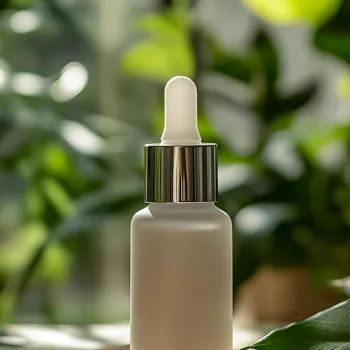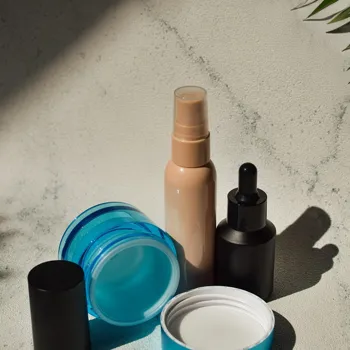Unveiling the Power of Serums: Dive into the Science Behind Skincare's Game-Changer. Curious? Read on for the secret formula
In the bustling world of skincare, where new products appear faster than you
can say "glow-up," serums have carved out a special niche. These potent potions, often packaged in small bottles with droppers, are more than just fancy face lotions.

They are, in fact, highly concentrated treatments designed to deliver powerful ingredients directly to your skin. But what exactly makes a serum different from a moisturizer or a toner, and how do you use them correctly to achieve that coveted healthy skin?
Let's dive into the science behind serums and unlock their secrets.
Serums deliver targeted skincare with potent active ingredients
Serums are different from your regular creams. Think of moisturisers as the comforting blankets for your skin, providing hydration and creating a protective barrier against the environment. Serums, on the other hand, are the targeted missiles.

They get deep into the skin, delivering powerful concentrations of active ingredients. They are designed to tackle specific problems like pigmentation, wrinkles, or dullness, making them a valuable tool in any skincare routine. The molecules in a serum are smaller than that of a cream.
Serums contain active ingredients for skin problems: hyaluronic acid, vitamin C, retinol, niacinamide. Choose wisely
Now, you might be wondering, what exactly are these "active ingredients" we keep talking about? Well, that's where the science really shines. Serums can be filled with ingredients that target various skin problems. Hyaluronic acid is a hydration magnet.

It draws moisture from the air and locks it into your skin, leaving it plump and dewy. Vitamin C is your everyday serum for brighter skin and protection from sun damage. It is like a shield against those nasty free radicals that cause premature aging. Retinol has been a skincare superstar.
It promotes cell turnover, reduces fine lines, and improves skin texture. Niacinamide calms inflammation, minimizes pores, and evens out skin tone. Understanding these key ingredients is very important. This way you can select the right serum for your specific skin type and concerns.
Serums need few drops, apply before moisturizer for best results
The beauty of serums lies in their potent concentration. This means that you typically only need a few drops to cover your entire face. The best time to apply a serum is usually after cleansing and toning, but before moisturizing.

This allows the serum to penetrate deeply into the skin without being blocked by heavier creams. Gently pat or massage the serum into your skin using your fingertips. Avoid rubbing too harshly, as this can irritate the skin.
Allow the serum to fully absorb for a few minutes before applying your moisturizer. That becomes the seal that all the goodness is locked in. This step-by-step approach ensures that you are maximizing the product and seeing the best possible results.
Choosing the right serum for your skin type and concerns
Choosing the right serum can feel overwhelming, especially with the sheer number of options available on the market. The first step is to identify your skin type and concerns. Do you have dry skin that needs a hydration boost? Or oily skin that is prone to breakouts?

Or perhaps you are concerned about fine lines and wrinkles? Once you know your skin type and needs, you can start to narrow down your choices. Read labels carefully and look for serums that contain ingredients known to address your specific problems.
If you are unsure, it is always a good idea to consult a dermatologist or skincare professional. It is alright, many of us also don't know and it is a professionals job to inform us.
Consider serum formulation: water-based suits oily skin, oil-based for dry skin. Test for irritation
Another important factor to consider is the formulation of the serum. Some serums are water-based, while others are oil-based. Water-based serums are generally lighter and more easily absorbed, making them a good choice for oily or combination skin.

Oil-based serums are richer and more moisturizing, making them better suited for dry or mature skin. Pay attention to the texture of the serum as well. It should feel comfortable on your skin and not too sticky or greasy.
Patch testing is always highly advised, especially if you have sensitive skin, to make sure that it does not cause any irritation.
Serums enhance skincare with patience for radiant skin
Serums are amazing additions to our skincare routine. Serums are not magic potions. They require consistent use and patience to see visible results. It may take several weeks or even months of regular application to notice a significant difference in your skin.

But with the right serum and a consistent skincare routine, you can achieve healthy, radiant skin. So go ahead and embrace the science of serums and unlock your skin's full potential. Remember, knowledge is power when it comes to skincare.
So you take the time to learn about different ingredients and products, and make informed choices that are best for your skin.
AI Generated Content. Glance/InMobi shall have no liability for the content











![[WATCH] 'Real Madrid, Ramadan and rest' - Mohammed Siraj how last-minute World Cup call-up changed February plan](https://g-mob.glance-cdn.com/public/fc/image/ByYT_LEmlrD0.webp)


